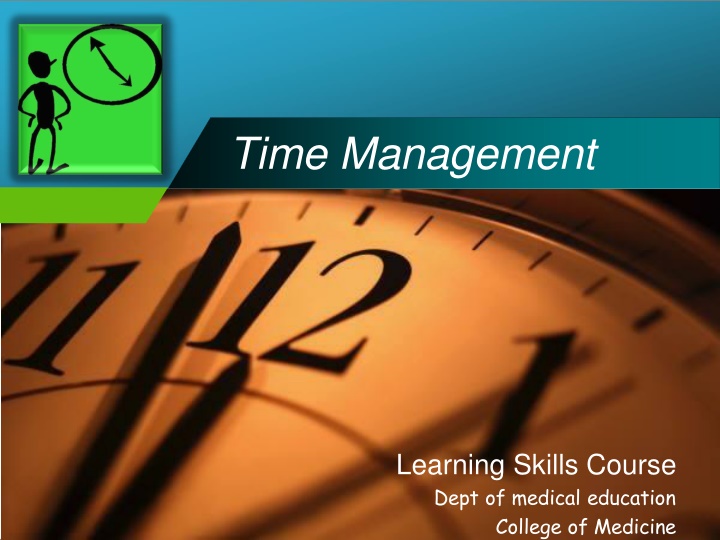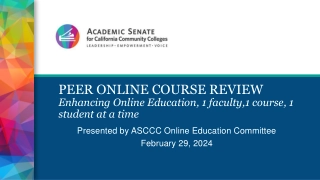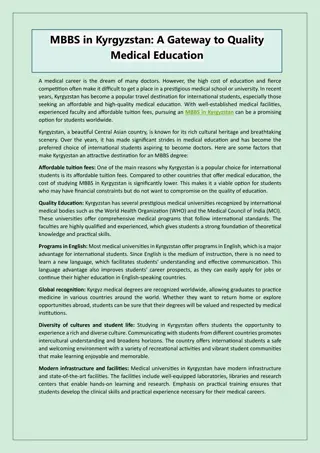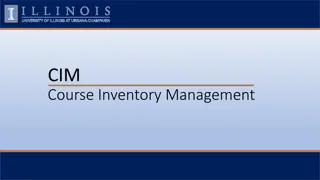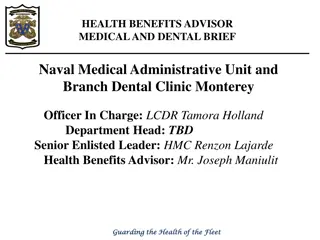Time Management Skills Course in Medical Education
This course focuses on developing effective time management skills for medical students. Students will learn to define time management, identify its characteristics, analyze their current effectiveness, utilize techniques, set priorities, and overcome barriers. The course covers topics like daily schedules, planning, time wasters, procrastination, and stress management.
Download Presentation

Please find below an Image/Link to download the presentation.
The content on the website is provided AS IS for your information and personal use only. It may not be sold, licensed, or shared on other websites without obtaining consent from the author.If you encounter any issues during the download, it is possible that the publisher has removed the file from their server.
You are allowed to download the files provided on this website for personal or commercial use, subject to the condition that they are used lawfully. All files are the property of their respective owners.
The content on the website is provided AS IS for your information and personal use only. It may not be sold, licensed, or shared on other websites without obtaining consent from the author.
E N D
Presentation Transcript
Company LOGO Time Management Learning Skills Course Dept of medical education College of Medicine
Time Management Skill LEARNING SKILLS: TIME MANAGEMENT Objectives of Time Management Skills By the end of this session, the student will be able to: Define Time management Describe the importance of Time management Identify Characteristics of Time management Analyze your current effectiveness at Time management Utilize good Time management techniques Identify ways to improve your Time management skills Define strategies to set priorities Identify stress and procrastination Identify steps to overcome barriers to effective Time management Develop a daily time table
Contents Introduction Importance of TM Daily schedules planning Time wasters Procrastination Take home messages
What did you do yesterday? We need one volunteer on the board. [5 minutes] Dear colleague, tell us how did you consume your time yesterday [the whole day, bed to bed] ?
Time management important? Time cannot be bought, stored or stopped - every second that passes is gone forever and can never be recovered or re-used "Perhaps the most valuable result of any work is the ability to make yourself do the things that you have to do, when it ought to be done, whether you like it or not." Thomas Huxley
Misconceptions ?? EfficiencyandEffectivenessarethesame Todoajobproperly,doit yourself There'sonlyoneright waytodoajob Timemanagementisawasteoftime A goodtimemanagerlackscreativity
The Basic Rule Time can't be managed, time is uncontrollable We can only manage ourselves and our use of time
- Define high and low periods of attention and concentration - Are you morning person" or a "night person - Sleep is often an activity that learners use as their time management "bank - When they need a few extra hours for studying, they withdraw a few hours of sleep - You need to have a social life, yet, you need to have a balance in your life
- If you are spending time at the Laundromat, bring your psychology notes to study. If you are waiting in line for tickets to a domestic flight, bring your biology flashcards to memorize ("Twofer" concept ) - This will allow you to reduce distractions which can "waste time. - Study in shorter time blocks with short breaks between to avoid fatigue - While you are taking a break, the brain is still processing the information
Learners basic principles 1- Identify "Best Time" for Studying 2- Study Difficult Subjects First 3- Use Distributed Learning and Practice 4- Make Sure the Surroundings are Conducive to Studying 5- Make Room for Entertainment and Relaxation 6- Make Sure you Have Time to Sleep and Eat Properly 7- Try to Combine Activities
How busy are you? Because we are not concentrating on the right things To succeed, we must concentrate on: 1. 2. The results to be achieved, not on being busy Setting priorities, which is vital The aims to ensure that we concentrate our effort on the high payoff tasks
Plan your time Everyone has 24 hours each day & 168 hours each week We must use this time to eat, sleep, work, relax, exercise, groom, attend class, and study It requires planning to get the most from these hours It requires self-discipline and control until the behavioral changes becomes an everyday habit Remember, plans and schedules for managing time are useless if one does not follow them
Plan your time Cont. People don't plan to fail but a lot of people do fail to plan." To Do List: - Break things down into small steps - Like a child cleaning his/her room - Do the ugliest thing first
Plan your time Cont. Daily Schedules: - Engagement books - Palm Computers or PPC - A piece of poster board tacked to a wall - 3 x 5 index cards O Fin rc se t, y po uu t dd oe w cn ide alluo pfon thethn eecs ets ys le it,ies th ;ecla ns es xe ts,stw ep orki,s c m oe na slts ru ,c ettic o.n ATlhloewnsbploacckesinfoyroueracshtudhyoutri,meev.eSnch edhuoleursftuordyafobrusay sticmheedwuhleen you are most alert and energized.
Effective Scheduling Review Keep a calendar and include all your activities Keep weekly and daily schedules schedule daily Keep a long-term schedule (one yr., four yrs.) and plan ahead Take into account the learning style when developing a study schedule. Select the times when you are most alert and the most appropriate place for you to study When setting up your schedule, organize tasks in order of priority Spread work out over a week period. amounts daily works better than does cramming Plan ahead your computer access needs and avoid time of heavy user traffic & review your Studying small
Once scheduling becomes a habit, you will discover that: It is easier to find something to do with extra time than to find extra time to do something.
Crisis Management It can lead to situations such as: 1 High levels of stress 2 A disrupted private life 3 Tiredness 4 Failure of projects
Assess your task!! yes yes Is the task urgent & important? Do you need to complete it today? Take immediate action No Allocate time to complete it yes ye s No Is the task urgent or important? Does it has a definite deadline? No Set realistic deadline for it yes Is the task necessary? Save the task for quiet time No Discard
Stress Management Being more in control of what you do Being productive, and secure in your daily tasks Enjoying what you do Giving your-self more quality time to relax and enjoy life outside work Hear me now, Believe me Later
Common Time Wasters Unclear communication Interruption Inadequate technical knowledge Meetings Tasks to delegate Unclear objectives and priorities Procrastination Lack of planning Acting with incomplete information Stress and fatigue Dealing with classmates Inability to say "No" Crisis management Personal disorganization
Procrastination Signs (Thief of Time) Paralysis by planning where implementation is delayed unnecessarily Perfectionism which often serves to delay tackling other problems and not cost-effective to achieve How to tackle procrastination? Boredom Hostility to tasks Set deadlines by which goals should be achieved The Deadline High
Why don't people manage their time? They don't know about it They are too lazy to plan They enjoy the adrenaline buzz of meeting tight deadlines They enjoy crisis management Failing to plan is planning to fail
how long should I study? The rule-of-thumb in college T o spend two hours studying for every one hour in class each week
Summary Time can't be managed We can only manage ourselves and our use of time Planning Urgent v/s Important
Finally Apply: Time management principles to your real life. Plan: well your college and home activities. You may find some difficulties for the application, try to find solutions. Reflect well on the time management activities as it will be your midterm assignment.
Questions !! T T H H A A N N K K Y Y O O U U
